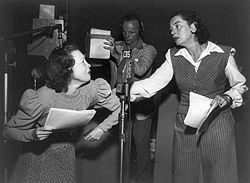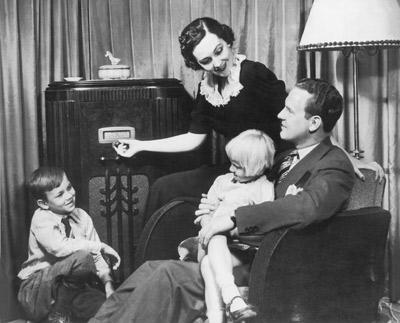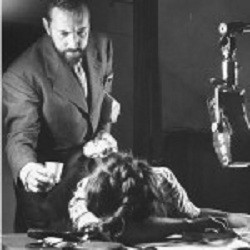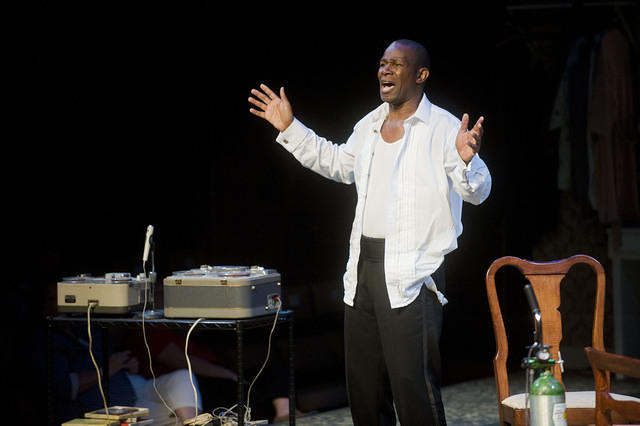 I’ve been so preoccupied with Satchmo at the Waldorf that I haven’t been paying nearly enough attention to this blog. I meant, for instance, to write a lengthy posting about something important that happened fifty years ago yesterday and is now almost entirely forgotten. Alas, I didn’t have time to do it justice, so merely mentioning it today will have to suffice: CBS pulled the plug on the last two surviving network radio dramas, Suspense and Yours Truly, Johnny Dollar, on September 30, 1962.
I’ve been so preoccupied with Satchmo at the Waldorf that I haven’t been paying nearly enough attention to this blog. I meant, for instance, to write a lengthy posting about something important that happened fifty years ago yesterday and is now almost entirely forgotten. Alas, I didn’t have time to do it justice, so merely mentioning it today will have to suffice: CBS pulled the plug on the last two surviving network radio dramas, Suspense and Yours Truly, Johnny Dollar, on September 30, 1962.
Both series had had long and successful runs–Suspense made its debut in 1942, Johnny Dollar in 1949–but the lights started to go out on old-time radio drama as early as 1948, the year when TV finally got going in earnest. The surprising thing, truth to tell, is that it lasted as long as it did, all the way into the Age of Camelot.
 The ranks of those who remember what golden-age radio meant to those who grew up with it are shrinking by the hour. I’m far too young to qualify, of course, but I’ve always been fascinated by what is now called “old-time radio,” and in 1996 I wrote a column for the now-defunct magazine Civilization in which I tried to explain how central it had been to American life in the first half of the twentieth century:
The ranks of those who remember what golden-age radio meant to those who grew up with it are shrinking by the hour. I’m far too young to qualify, of course, but I’ve always been fascinated by what is now called “old-time radio,” and in 1996 I wrote a column for the now-defunct magazine Civilization in which I tried to explain how central it had been to American life in the first half of the twentieth century:
Once upon a time there was radio, and it was beloved. Nobody loves TV: we take it for granted, like air or water. Radio was different. America is a big country, so big that newspapers and express trains did little to shrink it, and for most of its long history it was intensely provincial, simply by virtue of its vastness. Unless you were rich enough to travel, you knew only your town and the places nearby; the rest you read about in books, or visited once in a blue moon. But then radio came along, and all at once Americans could hear each other, no matter where they lived. You twisted a knob on the Atwater Kent in the living room in Dubuque or Diehlstadt, and suddenly you could hear Fred Allen cracking bone-dry jokes in a studio in Manhattan–or Ed Murrow standing on a London rooftop, listening to the German bombers roar through the night sky. And all of it was live: it happened and you heard it, just like that.
Indeed you did–but a time eventually came when ordinary people started to take the miracle for granted. In due course it was superseded by yet another, gaudier miracle, and that was that.
I wonder who (if anybody) was listening to the CBS Radio Network on the night of September 30, 1962. A couple of months ago I wrote a “Sightings” column for The Wall Street Journal in which I argued that 1962 was the year in which the world of postmodernity first started to take recognizable shape. I cited the premiere of Edward Albee’s Who’s Afraid of Virginia Woolf? as an example of how America was in the process of breaking with what I called “the earnest, self-confident tone of postwar culture.” How amazing, then, to think that Virginia Woolf opened on Broadway just thirteen days after Suspense and Johnny Dollar breathed their last. Sometimes–maybe most of the time–nothing much happens when worlds collide.
 Forgive me for quoting myself yet again, but I wrote a sentence in the introduction to the Teachout Reader that strikes me as worth recalling in this connection: “I feel the temptation to live in the past, but one can truly live only in the moment, and the last thing I want to do is end up like the pathetic narrator of ‘Hey Nineteen,’ the Steely Dan song about a no-longer-young baby boomer who tries to tell his teenaged girlfriend about Aretha Franklin but discovers that ‘she don’t remember/The Queen of Soul,’ subsequently realizing that ‘we got nothing in common/No, we can’t talk at all.'”
Forgive me for quoting myself yet again, but I wrote a sentence in the introduction to the Teachout Reader that strikes me as worth recalling in this connection: “I feel the temptation to live in the past, but one can truly live only in the moment, and the last thing I want to do is end up like the pathetic narrator of ‘Hey Nineteen,’ the Steely Dan song about a no-longer-young baby boomer who tries to tell his teenaged girlfriend about Aretha Franklin but discovers that ‘she don’t remember/The Queen of Soul,’ subsequently realizing that ‘we got nothing in common/No, we can’t talk at all.'”
I still feel that way, but it doesn’t stop me from listening to old episodes of Dragnet or Gunsmoke (both of which were better on radio than on TV) and wishing that I could turn back the clock to a time I never knew. The English language needs a word whose definition would be “nostalgia for that which one has not experienced.” That’s how I feel about the lost world of old-time radio. No, I wouldn’t want to live there, but I have a feeling that it would be a very, very nice place to visit.
* * *
To listen to the final episode of Suspense, go here.
To listen to the final episode of Yours Truly, Johnny Dollar, go here.
Jeff Kallman takes note of the golden anniversary of the end of network radio drama.
A scene from Woody Allen’s Radio Days:

 The great engine of publicity is starting to have its way with
The great engine of publicity is starting to have its way with